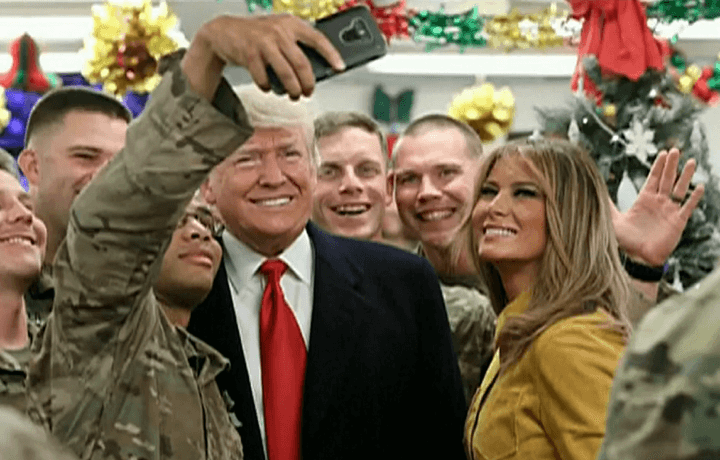White House critics are up in arms over the fact that U.S. service members were holding his signature red “Make America Great Again” hats in Ramstein, Germany and Al Asad Air Base in Iraq, hoping to get an autograph. This supposed violation of the Department of Defense’s directive on political activities is the latest tempest in the Washington teapot.
“MAGA” is the president’s campaign slogan, which makes it political and separate from his presidency. Because the president is officially a candidate for reelection, the Office of Special Counsel—the government agency with responsibility for investigating violations of the Hatch Act—has determined that “while on duty or in the workplace, [Federal] employees may not: wear, display, or distribute items with the slogan ‘Make America Great Again’ or any other materials from President Trump’s 2016 or 2020 campaigns; use hashtags such as #MAGA or #ResistTrump in social media posts or other forums; or display non-official pictures of President Trump.”
Members of the armed services are not covered by the Hatch Act, but they are subject to DOD Directive 1344.10, “Political Activities by Members of the Armed Forces,” last updated in February 2008. That directive prohibits service members from engaging in partisan political activities while in uniform. But does holding a MAGA hat while waiting for the president really count?
The “hipster veteran brigade” certainly thinks so. Pam Keith, a former Navy Judge Advocate (who, for the record, has lost two Florida Democratic primary campaigns, Senate in 2016 and Congress this year) wrote that displaying the hats “is a violation of the Uniform Code of Military Justice and its implementing regs.” And former Army Ranger and Obama defense appointee Andrew Exum said, “I sure do have a few questions” for the commanding general at Ramstein Air Base.
If, as one of my friends suggested, the hats were distributed by the White House advance team (an assertion for which I’ve seen no proof), then under the OSC’s determination, those employees would be in violation of the Hatch Act. But individual service members holding the hats while waiting to meet their commander-in-chief? I’m not convinced. Neither is the Air Force.
A spokesman for U.S. Air Forces Europe told the newspaper Stars & Stripes “Any time the commander in chief offers the opportunity to meet with Airmen, such as this official holiday visit by the President and First Lady, Airmen are welcome to participate. No policy violations have been brought to our attention at this time.” Had those service members been wearing the hats, there might me a case to make. But just holding them? Not so much.
Is our military playing politics?
Politicization of the military is much less of a problem than people want to make it out to be—either in terms of its extent or its potential harm. The men and women in uniform are a microcosm of America. You will find passionate Trump supporters and passionate Trump critics in every service and at every rank. The idea that the military is a right-wing ideological monolith is a myth. A pervasive myth, to be sure, but a myth nonetheless. I, for one, am not worried by uniformed personnel, officers included, having political opinions. They are, after all, citizens first.
General of the Army George C. Marshall, the Army’s chief of staff during World War II, is as responsible for the notion of the military officer detached from political society as anyone else. Before him, the idea that soldiers were also political actors wasn’t all that uncommon. Gen. Winfield Scott ran for president as a Whig while still serving as commanding general of the Army. He continued to serve in that role after his defeat. While the military has become much more “professionalized” since then, it is a fact that the modern concept of a “non-political” military is still young.
And while the military has grown somewhat more detached politically, the nation has become hyper-partisan. People have screamed that first Obama, and now Trump, are “not my president!” These people are now transferring their unhinged anger onto the military. There’s a dangerous assumption in there. I did not vote for either Bill Clinton or Barack Obama, and I disagreed with many, if not most, of their policies. But there was never one moment in my career where I looked at them as anything other than my commander-in-chief whose orders were to be followed.
While there are always outliers, those who join the military, especially those who make it a career, are largely motivated by a higher calling. Patriotism is a real thing, and the principle of “duty, honor, country” isn’t just for West Point cadets. It’s also nonpartisan. In the end, there’s no danger of the military “going rogue” over Trump, if that’s what people are really afraid of. There are, however, plenty of larger problems to fret over than the fact that people who wear the uniform like a president you don’t.




